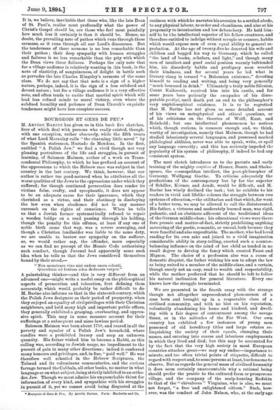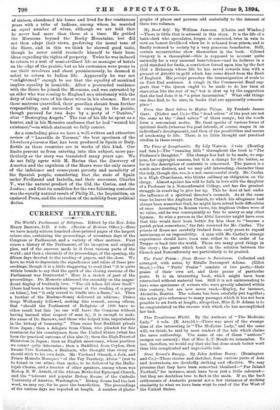BOURGEOIS ET GENS DE PEU.*
M. .A-RVEDE BA.RINE has given us in this book five sketches, four of which deal with persons who really existed, though, with one exception, rather obscurely, while the fifth treats of what Lord Macaulay calls• "the charming little novel" by the Spanish statesman, Hurtado de Mendosa. In the first, entitled "A Polish Jew," we find a vivid though not very pleasing portraiture of the life and struggles, in pursuit of learning, of Salomon Maimon, author of a work on Trans- cendental Philosophy, to which he has prefixed an account of the oppressions to which the Hebrew race was subject in that country in the last century. We think, however, that our author is rather too good-natured when he attributes all the worse qualities of the Jews to the oppressions under which they suffered; for though continued persecution does render its victims false, crafty, and sycophantic, it does not appear to be an adequate cause for their ignorance, which they cherished as a virtue, and their obstinacy in disobeying the law even when obedience did not in any manner encroach on the rights of conscience. When he tells us that a Jewish farmer systematically refused to repair a wooden bridge on a road passing through his holding, though the penalty for this offence, at least if any one of noble birth came that way, was a severe scourging, and though a Christian landholder was liable to the same duty, we are unable to bestow our sympathy on the sufferer, or, we would rather say, the offender, more especially as we can find no precept of the Mosaic Code authorising such conduct, though Juvenal had apparently some such idea when he tells us that the Jews considered themselves bound by their creed,— " Non monstrare vias nisi eadem sacra colenti,
Quzesitum ad fontem solos deducere verpos."
A. painstaking thinker—and this is very different from an advanced one—might write a useful essay on the philosophical aspects of persecution and toleration, first defining them accurately, which would probably be rather difficult to do- M. Barine also informs us that in the sixteenth century, which the Polish Jews designate as their period of prosperity, when they enjoyed an equality of civilprivileges with their Christian neighbours, and held many high and important public offices, they generally exhibited a grasping, overbearing, and oppres- sive spirit. This may in some measure account for their sufferings at a subsequent and More lawless period.
Salomon Maimon was born about 1750, and reared in all the poverty and squalor of a Polish Jew's household, where candles were a prohibited luxury and soap an unknown quantity. His father wished him to become a Rabbi, as this calling was, according to Jewish usage, no impediment to the pursuit of gain in many other directions ; indeed it conferred many honours and privileges, and, in fine, "paid well." He was therefore well schooled in the Hebrew Scriptures, the Talmud and its voluminous commentaries, and the curious 'farrago termed the Cabbala, all other books, no matter in what language or on what subject, being strictly inhibited to an ortho- dox Jew. Though we must admire his unquenchable thirst for information of every kind, and sympathise with his struggles in pursuit of it, yet we cannot avoid being disgusted at the
• Bourgeois et Gene de Pen. By Arvada Barine. Perla : Hachette and Co. coolness with whichhe narrates his aversion to a settled abode, to any physical labour, to order and cleanliness, and also at his propensity to intoxication and low debauchery. He held him- self to be the intellectual superior of his fellow-creatures, and therefore entitled to indulge without scruple or censure, habits which would expose men of even equal ability to general re- probation. At the age of twenty-five he deserted his wife and children and begged his way to Germany, which he called "the land of books, scholars, and light," and though many men of intellect and good social position warmly befriended him, his disorderly habits and profligacy soon wearied their kindness, and for several years he led what in literary slang is termed "a Bohemian existence," devoting himself to reading and writing, and being very generally "much bemused in drink." Ultimately a truly noble Silesian, Count Kalkreuth, received him into his castle, and for some years bore patiently the escapades of his disre- putable protege, until death put an end to the philosopher's very unphilosophical existence. It is to be regretted that M. Barine has not given us some detailed account of his views on metaphysical and ethical questions, or of his criticisms on the theories of Wolff, Kant, and Reinhold ; but one intellectual phenomenon he notices which, though curious, is common enough and, we think, worthy of investigation, namely that Maimon, though he had studied laboriously several languages, and possessed marked philological abilities, never was able to speak, write, or spell any language correctly; and this has seriously impeded the popularity of his system of philosophy, if indeed he had any consistent system.
The next sketch introduces us to the parents and early training of the mighty confrere of Homer, Dante, and Shake- speare, the cosmopolitan intellect, the poet-philosopher of Germany, Wolfgang Groethe. To criticise adequately the productions of the contemporary but by far the superior of Schiller, Korner, and Arndt, would be difficult, and M. Barine has wisely declined the task ; but he exhibits to his readers in vivid and lifelike colours the struggle between two systems of education,—the utilitarian and that which, for want of a better term, we may be allowed to call the disinterested. His father, a virtuous and moderately learned man, was rigid, pedantic, and an obstinate adherent of the traditional ideas of the German middle-class; his educational views were there- fore prosaic and matter-of-fact, strictly prohibiting anything savouring of the poetic, romantic, or unreal; both because they were fanciful and also unprofitable. The mother, who had loved reading for its own sake and joined to a vivid imagination considerable ability in story-telling, exerted such a counter- balancing influence on the mind of her child as tended in no small degree to develop the fancy which created Faust and Mignon. The choice of a profession also was a cause of domestic disquiet, the father wishing his son to adopt the law as being suited to a member of the middle-class, and a certain, though surely not an easy, road to wealth and respectability, while the mother preferred that he should be left to follow his natural inclination for general literature. Every one knows how the struggle terminated.
We are presented in the fourth essay with the strange though not altogether unprecedented phenomenon of a man born and brought up in a respectable class of a civilised community, and with no blot on his reputation, voluntarily abandoning his home and kindred, and dwell- ing with a fair degree of contentment among the savage Sioux, or in the solitudes of the Far West. Our own country has exhibited a few instances of young men possessed of old hereditary titles and large estates re- linquishing the society of their equals, changing their names, and entering into coarse and laborious employments in which they lived and died; but this may be accounted for by the fact that the very high society in most European countries attaches great—we may say undue—importance to minute, and too often trivial points of etiquette, difficult to regard with respect and, to some persons at least, burdensome to observe. But as regards the general mass of civilised humanity it does seem certainly unaccountable why a rational being should prefer the prairie to the cultured farm or prosperous village, and the company of the scalp-hunting Redskin to that of the " chivalrous " Virginian, who is also, we must not forget, "a free 'and enlightened citizen." Such, how- ever, was the conduct of John Nelson, who, at the early age
of sixteen, abandoned his home and lived for five continuous years with a tribe of Indians, among whom he married an equal number of wives, although we are told that he never had more than three at a time. He guided the Mormons beyond the Rocky Mountains, but did not then adopt their views, preferring the moral tone of the Sioux, and in this we think he showed good taste, though he never could reconcile himself to their loose ideas regarding the rights of property. Twice he was induced to return to a sort of semi-civilised life as manager of hotels on the edge of the prairie, but as his customers were prone to use their revolvers and shoot promiscuously, he deemed it safest to return to Indian life. Apparently be was not "enlightened" enough to see that the equality of mankind implies equality in homicide. After a protracted residence with the Sioux he joined the Mormons, and was entrusted by an elder who was coming to England as a missionary with the duty of taking care of his three wives in his absence. But as these matrons quarrelled, their guardian shrank from further responsibility, and succeeded in escaping to the prairie, though pursued for two days by a party of " Danites," alias "Destroying Angels." The rest of his life he spent as a hunter, and in his Memoirs confesses that he had "wasted his existence,"—in which statment we fully concur.
As a concluding piece we have a well-written and attractive review of " Lazarillo de Tormes," the best specimen of the Uteraturapivaresea that has been produced in Spain or Italy, fertile as these countries are in works of this kind. Our limits prevent AB from entering into this subject, more par- ticularly as the story was translated many years ago. We do not fully agree with M. Barine that the discovery of America and the expulsion of the Moors were the only causes of the indolence and consequent poverty and mendicity of the Spanish people, considering that the state of Spain under Ferdinand and Isabella, and their successor, Charles V., was the natural product of the Cid, the Cortes, and the Justiza; and that its condition for the two following centuries was the equally natural result of Philip II., the Inquisition, an enslaved Press, and the exclusion of the nobility from political duties.







































 Previous page
Previous page